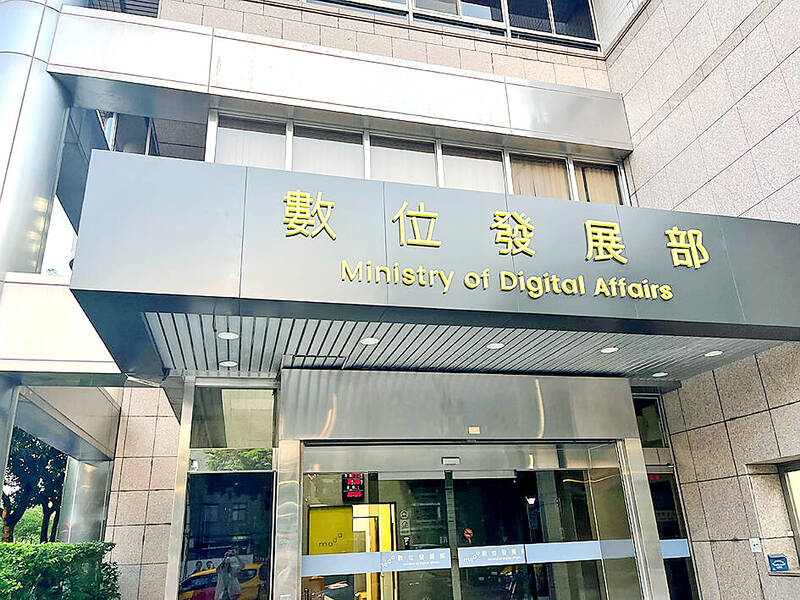Telecoms that contravene the Fraud Hazard Prevention Act (詐欺犯罪危害防制條例) and are consequently punished would be assigned with a limited number of telephone numbers within a designated period of time, an amendment to Regulations for Applying and Allocating Telecommunications Numbers (電信號碼申請及核配辦法) proposed by the Ministry of Digital Affairs said.
The amendment is subject to a 60-day public review before it takes effect.
The amendment is designed to reinforce the management of four-digit numbers that begin with “19,” which are usually assigned to government agencies offering emergency assistance, social aid organizations and charities, the ministry said yesterday.

Photo: Hsu Tzu-ling, Taipei Times
Some of the widely known numbers include the COVID-19 prevention hotline 1922, the Taipei City Government’s hotline for residents 1999 and Taiwan Railway Corp’s hotline 1933 for people to call when they see objects on railway lines.
Telephone numbers are rare national resources, so to prevent these special numbers from being abused for fraud, they are generally assigned to government agencies and state-run corporations, the ministry said.
As private organizations would be able to apply to use the special numbers, the regulations need to be amended to reinforce the management of the numbers, it said.
The amendment stipulates the conditions under which individuals and organizations must voluntarily return special service numbers to the government. When changing the use of these special numbers, they must file applications and secure approval from the government before they are allowed to continue using the numbers, the ministry said.
The amendment also lists the standards that must be met before individuals and organizations can apply for special service numbers. It also authorizes the ministry to conduct random inspections to ensure that the numbers are not abused and users are obligated to comply with the inspections.
Meanwhile the ministry has also proposed an amendment to the Subsidy, Reward and Assistance Regulations for Promoting Industry Innovation (數位發展部協助產業創新活動補助獎勵及輔導辦法), which authorizes it to subsidize, reward and assist digital industries in developing technology to deter fraud.
The amendment is subject to a 30-day public review period, the ministry said.

An essay competition jointly organized by a local writing society and a publisher affiliated with the Chinese Communist Party (CCP) might have contravened the Act Governing Relations Between the People of the Taiwan Area and the Mainland Area (臺灣地區與大陸地區人民關係條例), the Mainland Affairs Council (MAC) said on Thursday. “In this case, the partner organization is clearly an agency under the CCP’s Fujian Provincial Committee,” MAC Deputy Minister and spokesperson Liang Wen-chieh (梁文傑) said at a news briefing in Taipei. “It also involves bringing Taiwanese students to China with all-expenses-paid arrangements to attend award ceremonies and camps,” Liang said. Those two “characteristics” are typically sufficient

A magnitude 5.9 earthquake that struck about 33km off the coast of Hualien City was the "main shock" in a series of quakes in the area, with aftershocks expected over the next three days, the Central Weather Administration (CWA) said yesterday. Prior to the magnitude 5.9 quake shaking most of Taiwan at 6:53pm yesterday, six other earthquakes stronger than a magnitude of 4, starting with a magnitude 5.5 quake at 6:09pm, occurred in the area. CWA Seismological Center Director Wu Chien-fu (吳健富) confirmed that the quakes were all part of the same series and that the magnitude 5.5 temblor was

The brilliant blue waters, thick foliage and bucolic atmosphere on this seemingly idyllic archipelago deep in the Pacific Ocean belie the key role it now plays in a titanic geopolitical struggle. Palau is again on the front line as China, and the US and its allies prepare their forces in an intensifying contest for control over the Asia-Pacific region. The democratic nation of just 17,000 people hosts US-controlled airstrips and soon-to-be-completed radar installations that the US military describes as “critical” to monitoring vast swathes of water and airspace. It is also a key piece of the second island chain, a string of

The Central Weather Administration has issued a heat alert for southeastern Taiwan, warning of temperatures as high as 36°C today, while alerting some coastal areas of strong winds later in the day. Kaohsiung’s Neimen District (內門) and Pingtung County’s Neipu Township (內埔) are under an orange heat alert, which warns of temperatures as high as 36°C for three consecutive days, the CWA said, citing southwest winds. The heat would also extend to Tainan’s Nansi (楠西) and Yujing (玉井) districts, as well as Pingtung’s Gaoshu (高樹), Yanpu (鹽埔) and Majia (瑪家) townships, it said, forecasting highs of up to 36°C in those areas